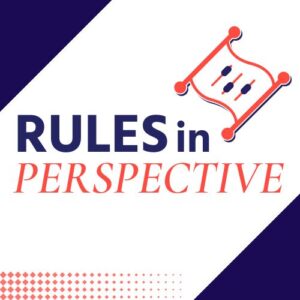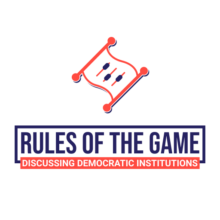
Rules in Perspective is a new segment on Rules of the Game – discussing democratic institutions. In this new segment I review and comment on my own podcast episodes.
In this episode of Rules in Perspective I review the podcast episode 38 on political institutions of Kuwait with Luai Allarakia.
My three takeaways:
- Re-read the constitution
- Procedural rules matter too
- Political parties are important
Listen to episode 38 and find the show notes here.
It would be great to hear your opinion and feedback on this new format. If you want to send me an email, you can reach me at rulesofthegame.ddi@gmail.com. If you find my discussions interesting and you’d like to support my work, consider buying me a coffee at https://www.buymeacoffee.com/rulesofthegame
Related Episodes:
Parliamentarism vs. Presidentialism with Tiago Santos (Ep. 11)
Beyond Presidentialism and parliamentarism with Steffen Ganghof (Ep. 16)
Moderated Parliamentarism with Tarunabh Khaitan (Ep. 29)
Full Transcript:
Hello! And welcome to the third edition of Rules in Perspective. In the next few minutes, I will provide my three take-aways from episode 38 on political institutions of Kuwait – a discussion I had with Luai Allarakia.
Rules in Perspective is a new segment on the Rules of the Game channel, where I reflect and comment on my own podcast episodes. My name is Stephan Kyburz and I am the host of the channel Rules of the Game – discussing democratic institutions.
You can find Rules in Perspective both as a video on my Youtube channel and as a bonus episode on my podcast Rules of the Game. The podcast is available on any major podcast platform. Please subscribe to my Youtube Channel and my podcast not to miss a future episode!
It is important to mention that these are my personal comments and do not necessarily reflect the views of my guests or the organizations they work for.
It was interesting to look at and discuss institutions and norms in Kuwait with Luai Allarakia. Well, you might ask, why should I care about Kuwait if I don’t live in Kuwait? That’s a fair question and my answer is that we can learn a lot from other countries in a comparative discussion. What is different there compared to my home country? What could we learn from that other institution or that other case?
After all, any political system is a collection of formal and informal rules and regulations and norms. And I think the discussion with Luai has brought that to light. Whether you call a country a democracy or an authoritarian regime doesn’t really matter. In the end what matters are the rules that are used to govern a country and how much direct and indirect political power the people really have. One question that you can ask in any developing political system is what rules would give the citizens more control, more political power? What institution would make a political system more democratic?
Point 1: Read the constitution and founding documents in your country
The constitution of Kuwait was drafted and written in the years 1961-62. As Luai explained, many interesting aspects that can be learnt from the members of the constitutional assembly of a country, are discussed in the founding documents. The founding fathers, as we usually call the people who draft the constitution – and I wish we had more founding mothers – have lots to say about governance, the division of power and democracy – about the principles that a country is founded on – or rather the principles that the framers or constitutional assembly wanted the country to be founded on. In the case of Kuwait, the most important aspect is the balance of power between the monarch, the emir, and parliament, the Kuwait National Assembly KNA.
It is super interesting to compare what the framers of a country originally intended, what hopes and worries they had, and what many years after the writing of the constitution the actual result is.
So in whatever country you live, I’d recommend going back to the founding documents and the constitution to re-read the parts on political rights, political institutions, and the division of power. I am sure there will be surprises or articles in the constitution that you have forgotten about. Feel free to share with me what you’ve found out.
Point 2: Who can initiate interpellations and motions of no confidence?
As Luai Allarakia explains in the interview, small procedural rules can be super important, and changing them could make a huge difference in how the political system works. So not only can major institutional reforms bring about change to the balance of power broader or political processes, but also smaller procedural rules. The main suggestion that Luai makes in the episode is that not single parliamentarians should be able to initiate interpellations, but only blocs of politicians that have the same interests. This would prevent single politicians from slowing down the entire legislative process. The motions of no confidence in contrast don’t seem to be too permissive, when compared to political systems in other countries.
Bottom-line here is that we should give enough attention to procedural rules and the agenda setting power in parliaments to know how political power is allocated and shared between the government and parliament.
Point 3: The important role of political parties
Kuwait is special in the sense that political parties are neither forbidden nor specifically regulated in the constitution. Luai’s opinion is that Kuwait should move forward to make political parties a more clearly defined part of the legislative process. Strengthening political parties would make political actions more stable and predictable.
As I have discussed in previous episodes, political parties play crucial roles in a political system, and we should not underestimate their importance. And I am not surprised that Luai is convinced that strengthening the parties in Kuwait would also improve the political process and the balance of power between the emir and major political factions.
If you are interested in a useful overview of the roles of political parties, I can recommend the paper Moderated Parliamentarism, written by Tarun Khaitan, that I discussed in episode 29 of the Rules of the Game podcast. In short, parties have important roles as intermediaries between citizens and politicians, and they also reduce costs in the political process. I link to the article and the episode in the description below.
This was the third edition of Rules in Perspective. Thanks for taking the time, I hope you enjoyed it. Feel free to send feedback to rulesofthegame.ddi@gmail.com
Please listen to related episodes on the relationship between the government and parliament. I can highly recommend the episodes on presidentialism and parliamentarism and semi-parliamentarism.
With Tiago Santos I discuss parliamentarism vs. presidentialism in episode 11. We discuss what the important differences between the two systems are, the advantages and disadvantages of both systems, and about his opinion on whether the electoral law, for instance proportional representation, matters for the well-functioning of the government system.
In episode 16, I discuss Steffen Ganghof’s book “Beyond Presidentialism and Parliamentarism: Democratic Design and the Separation of Powers” in which he studies and examines semi-parliamentarism at length.
And as already mentioned, with Tarunabh Khaitan I discuss his paper “Moderated Parliamentarism” in episode 29, a concept of a system of government that he describes in great detail in a paper titled “Balancing Accountability and Effectiveness: A Case for Moderated Parliamentarism”.
As always, I link to all episodes in the description below.
I appreciate you’ve taken the time to watch Rules in Perspective. See you next time.
